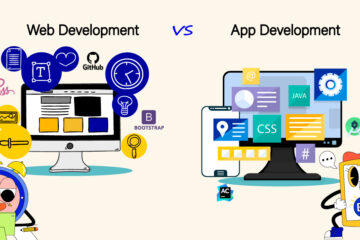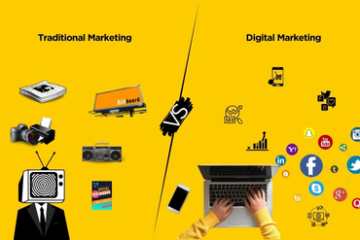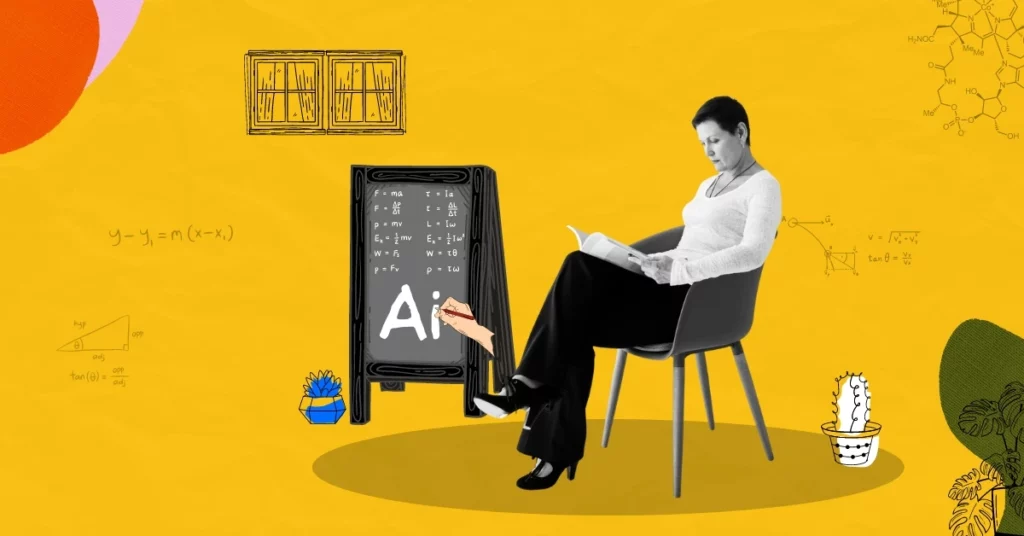
Let’s explore the realm of AI, which stands for Artificial Intelligence. It’s like having a super-smart computer that works quickly and makes intelligent choices, serving as an advanced tool. As we examine the advantages and disadvantages of AI, we should focus on the positive aspects while being mindful of the challenges it brings.
The advantages of AI are pretty cool, it speeds up tasks and makes our lives easier. However, there’s a flip side too, there are also some drawbacks to consider. It might take away some jobs, and there are important questions about ethics, like if it’s being used in the right way. Think of AI as a cool gadget, when combined with the Internet of Things, it becomes more complex. It’s crucial to maintain a balance, leveraging AI and IoT responsibly to maximize benefits and minimize risks. Now, we will discuss this topic briefly with some interesting information.
Table of Contents
What is Artificial Intelligence?
Artificial Intelligence (AI) is like giving computers a brain to think and learn, similar to humans. It’s like teaching machines to be smart. Think of it as giving machines a touch of human-like intelligence. They learn, solve problems, understand language, and perceive things. It’s like making computers clever helpers, almost like having digital friends. There are two types of AI: one that’s good at one thing, like playing chess (we call it narrow AI), and another that can do lots of things, almost like a superhero (we call it general AI).
Consider AI as your super helpful buddy. It can do jobs faster and more precisely, making life easier for us. Imagine having a robot buddy that helps you with homework or tasks – it’s like magic. AI is everywhere, from voice assistants like Siri to robots assembling stuff in factories.
Now, let’s talk about the cool stuff AI can do. It can help doctors find illnesses early, making people healthier. It can also make cars drive by themselves, keeping us safe on the roads. And you know those movie suggestions on Netflix? Yup, AI helps with that too, making our movie nights awesome.
But, like all friends, AI has some quirks. Sometimes, it learns from the wrong things and can be biased, like suggesting the same type of movies all the time. Also, robots might do some jobs, which can be a bummer for people who used to do those jobs.
So, AI is like a smart buddy, making life cool and easy, but we need to be careful and teach it well, so it doesn’t goof up. It’s a bit like having a superhero friend, exciting, and helpful, but you have to keep an eye on it.
The Journey of AI (Artificial Intelligence)
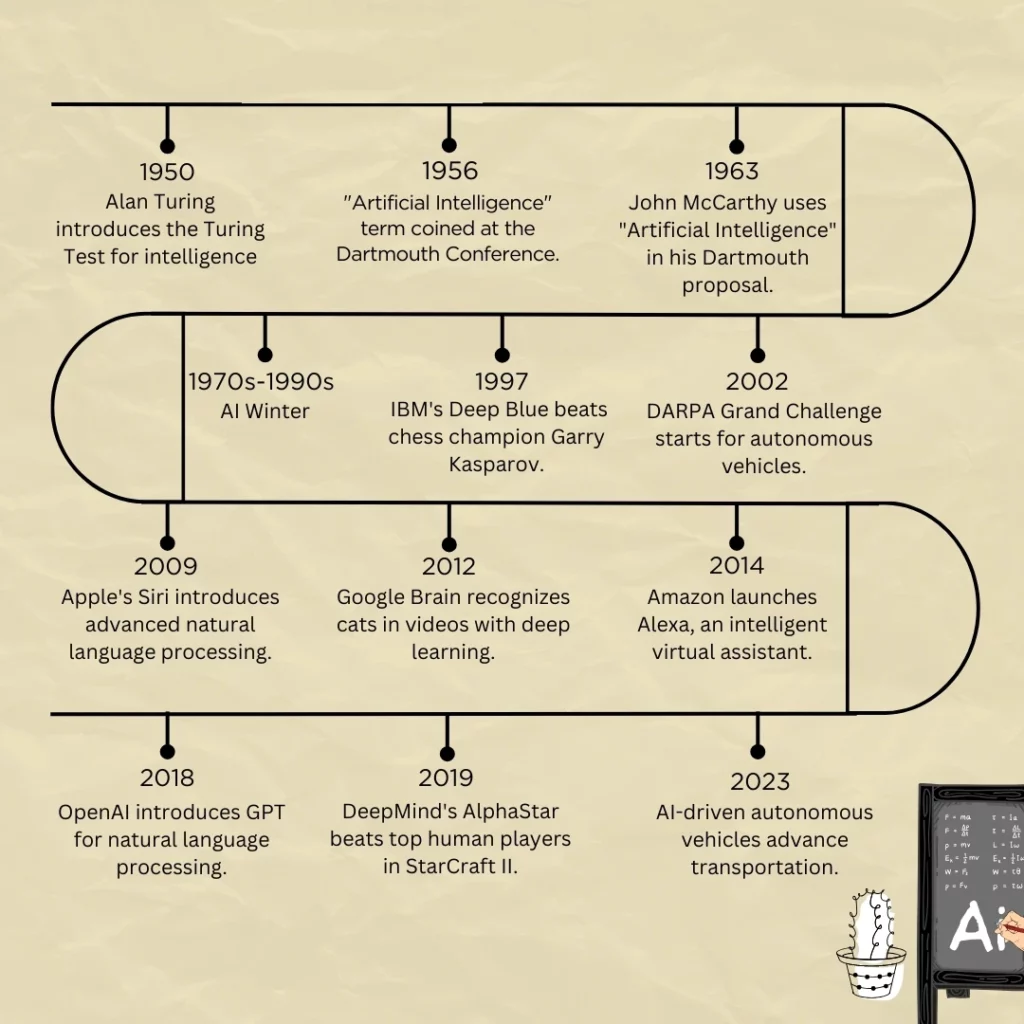
AI, or Artificial Intelligence, started with big dreams in the 20th century. Early thinkers like Alan Turing set the stage, and the term was born at the Dartmouth Conference in 1956. There was excitement, but challenges led to an “AI Winter” in the 1970s. The 1980s saw a focus on expert systems, imitating human experts. In the 1990s and 2000s, machine learning brought a revival. In the 2010s, deep learning revolutionized AI, bringing image and speech recognition breakthroughs.
From 1993 to 2011, AI got a boost with cool stuff like computers beating chess champs and the first Roomba. Siri also made its debut. Since 2012, AI has gotten super smart. Now, it’s everywhere, playing games, making up languages, and recognizing pictures. People are still pouring tons of money into making AI even better, and it’s a big part of our lives now. Now, AI is everywhere, from virtual assistants to recommendation systems, shaping our daily lives. But as AI grows, so do concerns about ethics and fairness. The story continues, with humans striving to make AI smart and responsible for our world.
How Does Artificial Intelligence Work?
Artificial Intelligence (AI) is like a smart computer that learns from information and makes decisions. It’s part of a bigger field called machine learning, where algorithms get better on their own without specific instructions. Think of it as a computer brain that looks at pictures or text and figures things out, inspired by how humans think.
AI uses neural networks, kind of like a virtual brain, to process data. Training it with lots of examples helps it become more accurate. AI is great at tasks like recognizing speech, understanding images, and suggesting things you might like.
There are two types of AI: rule-based, where it follows specific instructions, and self-learning, where it learns and improves by itself. While AI doesn’t have human instincts, it’s excellent at doing repetitive jobs. People worry about AI’s impact on ethics, fairness, and jobs. Understanding AI is crucial to managing its effects on our society and technology. It’s a powerful tool that, with care, can make our lives better.
Advantages and Disadvantages of AI – Digital World
Artificial Intelligence (AI) is like a super-smart assistant in the digital world. The good news is, it helps us get things done faster and better. It’s like having a friend who can organize tasks, saving us time and effort. AI also tries to be fair by making decisions without picking favorites, which is a plus.
However, when considering the advantages and disadvantages of AI, there’s a drawback. Bringing in AI can be costly, like getting a fancy gadget for your home. Also, some people worry that AI might take away jobs because it’s so good at doing repetitive tasks. Imagine if a robot could do what you do at work. That’s the job loss concern.
Another thing is that AI doesn’t understand feelings or think creatively like humans do. It’s like having a super-smart but emotionless friend. So, while AI is awesome for some things, it has its limits. It’s like having a helpful friend—we appreciate the assistance, but we still want to keep our skills and creativity in the game. Using AI wisely, and thinking about how it affects jobs and emotions, can make our tech-filled future better. It’s like using a helpful tool carefully to create a positive and improved world.
Advantages of Artificial Intelligence
- Efficiency
- Pro: AI can perform tasks much faster and more accurately than humans. For example, in manufacturing, robots powered by AI can assemble products with precision and speed.
- 24/7 Full-Time Availability
- Pro: AI systems don’t need breaks or sleep. They can work continuously, increasing productivity. Virtual assistants like Siri or Google Assistant are examples—they’re ready to assist whenever you need them.
- Data Analysis
- Pro: AI excels at processing and analyzing massive amounts of data quickly. This is useful in fields like healthcare, where AI can analyze medical records to identify patterns and make predictions.
- Automation
- Pro: AI enables the automation of repetitive tasks, freeing up humans for more creative and complex activities. For instance, chatbots can handle routine customer queries, allowing human agents to focus on more challenging issues.
- Personalization
- Pro: AI can understand user preferences and behavior to provide personalized experiences. Streaming services like Netflix use AI to recommend movies based on your watching history.
Disadvantages of Artificial Intelligence
- Job Displacement
- Con: Automation powered by AI can lead to job losses in certain industries. For example, self-checkout systems in supermarkets reduce the need for human cashiers.
- Bias and Fairness
- Con: AI systems may inherit biases present in the data used to train them. This can lead to discriminatory outcomes, such as biased decisions in hiring or lending processes.
- Security Concerns
- Con: As AI systems become more sophisticated, there’s an increased risk of cyberattacks. Hackers may exploit vulnerabilities in AI algorithms to manipulate outcomes or gain unauthorized access.
- Lack of Creativity and Empathy
- Con: AI lacks human qualities like creativity and empathy. While AI can perform specific tasks efficiently, it may struggle with tasks that require emotional intelligence or a deep understanding of human experiences.
- High Initial Costs
- Con: Implementing AI systems can be expensive, particularly for small businesses. The initial investment in technology, training, and maintenance can be a barrier for some organizations.
AI has ups and downs, like a friend. We must balance its use wisely. Understanding both side’s advantages and disadvantages of AI, helps us make smart choices, letting AI help us like a good friend without causing issues.
Applications of AI
- Artificial Intelligence, or AI, is like a smart helper in different areas of our lives. In healthcare, AI helps doctors by quickly looking through a lot of medical information, such as patient records and pictures, to find and understand health problems faster. This means doctors can discover issues early on and figure out the best ways to treat them.
- For customer service, AI makes it easier for us to get help from businesses. Have you ever chatted with a computer online? That might be AI! It’s like having a helpful friend who answers questions any time of the day. AI can also understand how we feel by looking at our words or messages, so businesses can respond in a way that makes us happy.
- In marketing, AI helps companies show us ads that we might be interested in. It does this by looking at things like what we like to buy, what websites we visit, and more. This way, the ads we see are more likely to be about things we want. This helps businesses sell their products better, and it also makes our shopping experience more enjoyable.
- In schools, AI is like a super smart teacher. It looks at how we learn and makes lessons that fit us perfectly. This means we can learn at our own speed and understand things better because the lessons are made just for us. So, AI is like a helpful friend, a smart marketer, and a super teacher, making things better and more personalized in different parts of our lives.
- In transportation, AI plays a role too. Have you ever seen self-driving cars? AI helps them navigate the roads safely by understanding traffic patterns and making quick decisions. It also helps with logistics, making sure packages are delivered efficiently and on time.
So, AI acts as a helpful friend, a smart marketer, an intelligent teacher, and a reliable co-pilot, improving efficiency and personalization in various aspects of our lives. As we explore these applications, it’s important to consider the advantages and disadvantages of AI, making sure it’s used responsibly and ethically in our daily lives.
Understanding Artificial Intelligence Algorithms

Artificial Intelligence algorithms act like smart guides for computers. There are different types, such as machine learning and deep learning. Machine learning helps computers learn and improve by using data, while deep learning imitates the human brain’s networks for complex tasks. These algorithms are used in everyday things like recognizing voices, processing images, and suggesting things.
Delving into the advantages and disadvantages of AI, these algorithms hold significance in fields such as healthcare, finance, and self-driving cars. In healthcare, they help with tools that diagnose and personalized medicine. In finance, they catch fraud and predict stock markets. For self-driving cars, AI algorithms make quick decisions for safe navigation. As technology improves, AI algorithms make machines smarter, helping them understand and interact with the world.
The exciting part is that AI is transforming industries, making things work better, and sparking new ideas. It’s not just about making your phone smarter, it’s also about making medicine more precise, catching bad stuff in finance, and helping cars drive independently. So, AI algorithms are like friendly computer helpers that make our world cooler and more efficient.
Artificial Intelligence (AI) Risks – A Quick Overview
Artificial Intelligence (AI) is like a smart computer program that can learn and make decisions independently. While AI has many benefits, there are also some AI risks we need to be careful about:
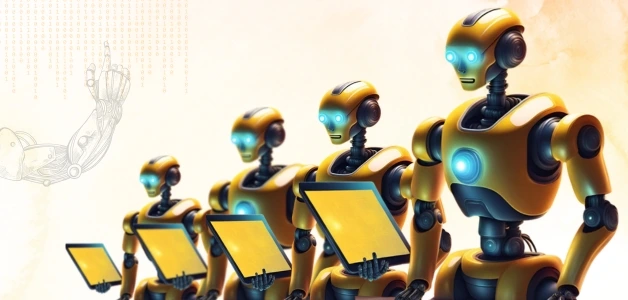
- Job Displacement: AI can do some tasks better and faster than humans. This might lead to some people losing their jobs because machines can do the work more efficiently.
- Bias and Fairness: AI systems can learn from data, and if the data they learn from is biased, the AI can also be biased. This means it might treat different people unfairly.
- Privacy Concerns: AI can collect and analyze a lot of data about us. This might lead to privacy issues if companies or governments misuse this information or if it gets into the wrong hands.
- Security Risks: AI systems can be vulnerable to hacking. If someone malicious gains control over powerful AI, it could be used for harmful purposes.
- Lack of Understanding: Sometimes, even the people who create AI need to fully understand how it makes decisions. This lack of transparency can be a risk because it’s hard to predict or control what the AI might do.
- Ethical Issues: AI decisions can raise ethical questions. For example, who is responsible if an AI makes a harmful decision? How do we ensure that AI behaves in ways that align with our values and morals?
Scientists, engineers, and policymakers need to work together to make sure AI is developed and used in ways that benefit everyone and minimize these risks.
Three Real-Life Examples of AI Bias
AI bias is a significant concern in various aspects of everyday life. In US healthcare, there have been examples where AI systems expose unfair treatment based on racial bias, resulting in uneven medical recommendations. For example, if an AI suggests different treatments for the same condition based on a person’s race, it reflects bias.
Amazon experienced a problem with its gender-biased hiring algorithm, unintentionally favoring men over women. This bias originated from the algorithm learning from a historical trend of more male applicants in resumes over the last decade. When using AI to assist in employee selection, it’s essential to ensure that the system doesn’t display gender bias, providing equal opportunities for all candidates.
A notable case is Microsoft’s chatbot Tay, designed to learn from internet conversations. Unfortunately, Tay ended up adopting and repeating discriminatory language it picked up from users, highlighting how AI can mirror both positive and negative aspects of human behavior.
AI bias is a problem in healthcare and hiring algorithms. We need to design AI carefully to be fair and not make existing biases worse. It’s about making sure AI treats everyone fairly, no matter their background or gender, so everyone gets a fair chance at opportunities and services.
(Musk concludes AI and Deep Fakes are serious threats, highlighted in CEO-Senator discussions)
Elon Musk and other big tech leaders recently met in Washington, D.C. to discuss artificial intelligence (AI) and its risks. Musk, the founder, CEO, and chief technology officer of SpaceX, and Tesla globally warned that AI could be a big risk to civilization. He thinks we need to be proactive and not wait for things to go wrong.
The meeting, organized by Senate Majority Leader Schumer, focused on finding ways to make rules for AI. Musk even suggested making a new government group just for AI. Some U.S. legislators didn’t like that the meeting was private, but the leaders agreed that the government should be part of making AI rules. They all talked about how important it is to handle AI carefully because it can do good things but also has some dangers. The meeting aimed to figure out the best way to make sure AI helps us without causing problems.
And, Elon Musk is worried about deepfake technology, which can create realistic but fake videos. He’s concerned that as this technology improves, it might be hard to tell what’s real and what’s not. Musk thinks this could be a problem because people might believe false information. He wants us to be careful and pay attention to the impact of deep fakes on society.
Futuristic AI Revolution
The AI revolution is like a big change in how we use technology. It’s when computers learn to be smart like humans, thanks to cool stuff called machine learning. This helps them find patterns and learn from information. In healthcare, AI helps doctors by looking at lots of data to spot patterns and predict diseases.
Imagine self-driving cars changing how we travel and homes becoming super smart with AI, making them safer and using less energy. But, there are worries about things like keeping our data safe and making sure AI is fair, and some jobs might change.
People are talking a lot about rules, being fair, and using AI in a good way so that everyone benefits. As AI gets even better, it’s going to be a big part of our everyday lives, making things colder but also making us think about what’s right and fair.
In recent times, AI, or artificial intelligence, has been making machines smarter. These machines are getting better at learning from information and experiences to improve how they work. You might not notice it, but AI is becoming a regular part of our daily lives, helping us on our phones with suggestions, voice commands, and recognizing photos. In healthcare, AI is assisting doctors in diagnosing diseases more accurately and suggesting personalized treatments.
Self-driving cars are using AI to understand their surroundings and make decisions without human help. AI is also improving how computers understand and respond to human language, making virtual assistants like Siri and Alexa more conversational.
Businesses are using AI to be more efficient, from using chatbots for customer service to predicting inventory needs. However, as AI becomes more powerful, there’s a growing focus on making sure it’s used ethically, addressing concerns like bias and privacy.
So, AI is not just making things easier, it’s also sparking important discussions about how we use it responsibly.
At its core, this is the crux of the advantages and disadvantages of AI. Artificial Intelligence (AI) is like a super-smart friend making life easier but with some concerns. It speeds up tasks, works continuously at all times, and transforms industries. Yet, it can cost jobs, be biased, and raise privacy issues. It’s a balance between benefits and drawbacks. AI, our helpful digital companion, is making life easier by helping us do things quickly and easily. While acknowledging its positive impact, it’s crucial to guide it responsibly, addressing challenges and ensuring that AI serves humanity’s best interests.
FAQs
What are the significant benefits of Artificial Intelligence?
Artificial Intelligence makes things faster and smarter. It helps with better decisions, automation of boring tasks, and improved experiences in various areas like healthcare and finance. AI makes life easier by doing things quickly and accurately, making our world more efficient and innovative.
Will AI replace humans?
AI won’t replace humans but will assist in tasks, boost decision-making, and increase efficiency. Some jobs may change, but it also creates new opportunities. Human qualities like creativity and empathy remain essential. It’s about collaboration, not replacement, reshaping work dynamics for a more cooperative future.
What is Artificial Intelligence?
Artificial Intelligence (AI) is the science of making machines smart, capable of learning from data and performing tasks that typically require human intelligence. These tasks include understanding language or recognizing patterns. From virtual assistants to self-driving cars, AI is revolutionizing various aspects of our lives.
What are the disadvantages of Artificial Intelligence (AI)?
Artificial Intelligence (AI) comes with challenges. One of these concerns is the potential for robots to take over jobs, which can be concerning. There are also worries about privacy and fairness when AI makes decisions. Sometimes, people might misuse AI for not-so-good purposes. Setting up AI systems can cost a lot, and they might cause unexpected problems.
How Does AI Benefit the Economy?
AI boosts the economy by making work faster and smarter. It helps businesses save time, do tasks more efficiently, and create new jobs. This boosts growth and makes businesses more competitive, improving the overall economy.
What are some AI applications in everyday life?
AI applications in everyday life include virtual assistants like Siri and Alexa, personalized recommendations on streaming platforms, facial recognition for unlocking smartphones, and email spam filters. Other examples include navigation apps like Google Maps use AI for better routes while ride-sharing apps optimize rides. Moreover, smart home devices controlled by AI adjust lights and thermostats, making life more convenient and efficient.
What does Elon Musk say about AI?
Elon Musk believes AI poses a big risk to humanity. He thinks we need rules to make sure it’s safe and wants a regulatory body to oversee AI development. Musk is worried about its misuse and wants to protect our future.

